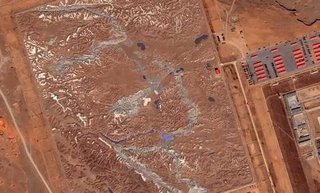The brewing war between Israel and Hizbollah/Hamas strikes me as one with an overly "dialogical" strategy on behalf of both parts.
When a Danish news reporter (sitting in Cairo of course) foresaw that Israel would bomb infrastructure in Lebanon to punish the government for not taking care of Hizbollah, I scowled and thought "stupid you, what would they gain from smashing at the frail democratic and recently Syrian-free government in Lebanon? They'll rather go more surgically after Hizbollah". But alas, he was right and I was naïve on Israeli strategic dynamics.
Lebanon is a weak state, and to date
"The Lebanese security forces remained unable or unwilling to enter Palestinian refugee camps [...] and to deploy forces to much of the Beka?a Valley, southern Beirut, and the south of the country bordering Israel."This of course means that Israel can have its way with Lebanon, in two general directions:
1) First option is that they bomb them to signal strength and resolve to the onlookers. The gains from this show of force is rather limited - at least concerning the safe return of the soldiers kidnapped. A follow-on on this scenario is an actual invasion of the south of Lebanon to hit Hizbollah camps. This has been tried in 1978 and 1982 - none really succesful.
2) Second option is support for pro-israeli (Christian) elements of Lebanese government. This is a difficult option, as no-one would like to be "tainted" by connections to the Israelis. However, this is the only real option to nurture a strong and dependable Lebanese security-strategy and a strengthening of the state. This was tried partly in Israels collaboration with Lebanese president-to-be
Bachir Gemayel who was assasinated in 1982.
You don't have to speculate a lot to think that option one was chosen as Israel have a new government (without old generals as far as I know) that needs to reassert that Israel is the strongest power in the Middle East. Furthermore it is also a way of cracking down on Hamas and their new government.
Both of the options are a strong states domination over a weak one and in the first case an illustration that the only real way security is created is by building a strong and reliable state. Somalia is the best contemporary example of the kind of black criminality that can fester in the intestines of a country without a working state. Israel doesn't do itself any good with the excessive bombings, but due to its taboo-status in Middle Eastern countries, other options are in reality closed for them. This is where the NGOs have their place in the world, and I bet there is a flurry of activity, doing second track diplomacy at the moment.



